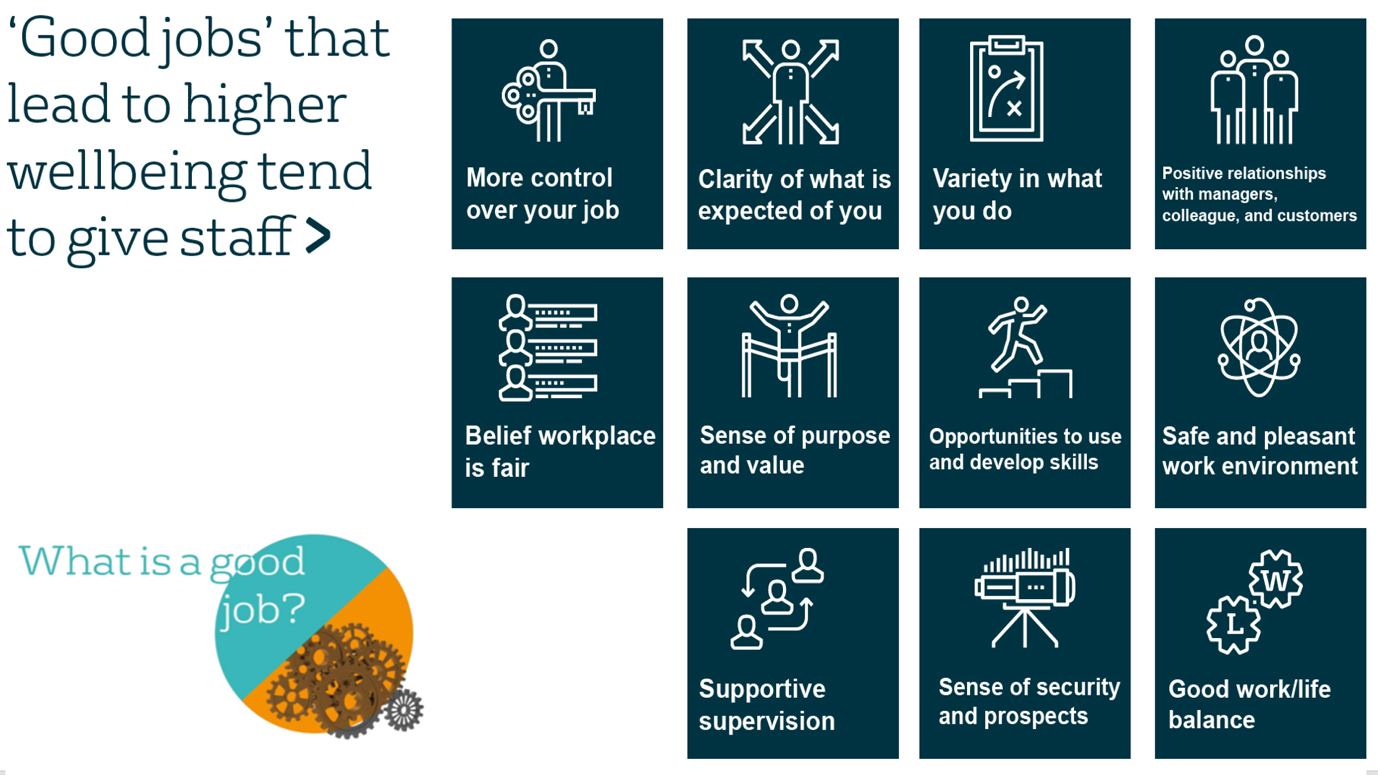Once someone has a terminal illness, they are often encouraged to take sick-leave even if they want to keep on working. And once they leave work, it is unlikely that they will return even though some people can live with a terminal diagnosis for many years. In this article, we provide advice for negotiating these situations in the workplace.
We know that staying in work can be excellent for personal wellbeing and so there should be more opportunities for terminally ill people to be supported to continue working for as long as they feel able.
It might also help in thinking about how to support those living with someone facing a terminal illness. These tips are informed by ethnographic research with people of working age who are terminally ill, research about job quality and wellbeing, and personal experience of working whilst living with a terminal illness. Below is an image of factors that research has shown makes a ‘good job’. We encourage you to use these to think about how you may reshape or tailor a job for someone with a terminal illness to support their wellbeing. We’ve also used them to inform our tips below, which are mainly intended at how managers can support colleagues but can also be useful for informing company policy and work cultures.
- Work as a sense of purpose: appreciate that work can make life meaningful for people. Some people may want to take extended sick leave or retire early. Others will want to work for as long as they can and do tasks that feel purposeful to them. Do not presume that you know what is best for the person or what they will prefer. Ask open questions and be willing to keep the conversation going about what their goals are in terms of working. Try not to rush into making decisions too soon; perhaps offer a sabbatical rather than retirement to give time to consider options. The Dying to Work campaign also outlines other reasons people may want to stay in employment when they have a terminal illness and the difference this has made.
- Adopt a flexibility mindset: this includes both flexible working patterns, but also reconsidering the necessity of certain annual HR or training requirements; shorter term targets and reviews are likely to become more appropriate. An example we have encountered is employers offering reduced baseline hours or project-based work to enable staff to take on tasks they feel capable of doing whilst also keeping connected with colleagues and social networks. There are also other benefits of flexible working such as reduced burnout.
- Communication and uncertainty: welcome an honest conversation about the uncertainty of prognosis and timelines. The person may not know what their prognosis is, and even if they do, terminal illness can be unpredictable. It is likely that they will have periods of wellness and periods of sickness, there may not be a straight-line decline. Borrowing techniques from coaching, here’s a list of some things to listen out, including the importance of exploring an issue further.
- Terminal illness and disability: recognise that someone’s diagnosis may now mean they need to have reasonable adjustments made in the workplace. As one participant described it, within the UK, from a discrimination perspective, cancer is viewed as a disability in the workplace and the employee should be appropriately supported. It is not just the overall diagnosis to consider, but also how side-effects from treatment may have an impact on what they can do, including affecting ability to focus or attend long meetings. Using existing organisational policies for reasonable adjustments can be a helpful starting point. The Working through Cancer network can be a useful contact for support for employees and managers.
- Privacy at work: consider the office space. Is it open plan or do they have access to private areas? Is working from home an option? This can be important both for the conversations you have with them, but also in case they need to take phone calls about appointments and test results. Whilst some workers will want managers to know about their situation, they may want more discretion when it comes to the wider workforce.


Rate and Review
Rate this article
Review this article
Log into OpenLearn to leave reviews and join in the conversation.
Article reviews